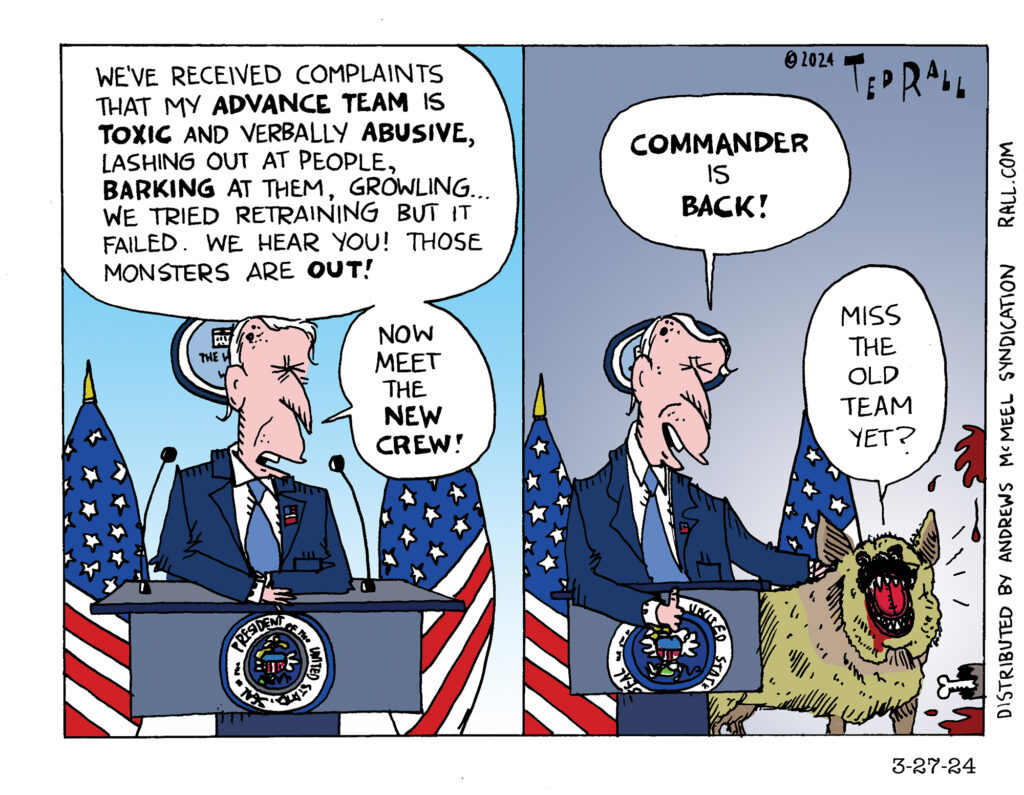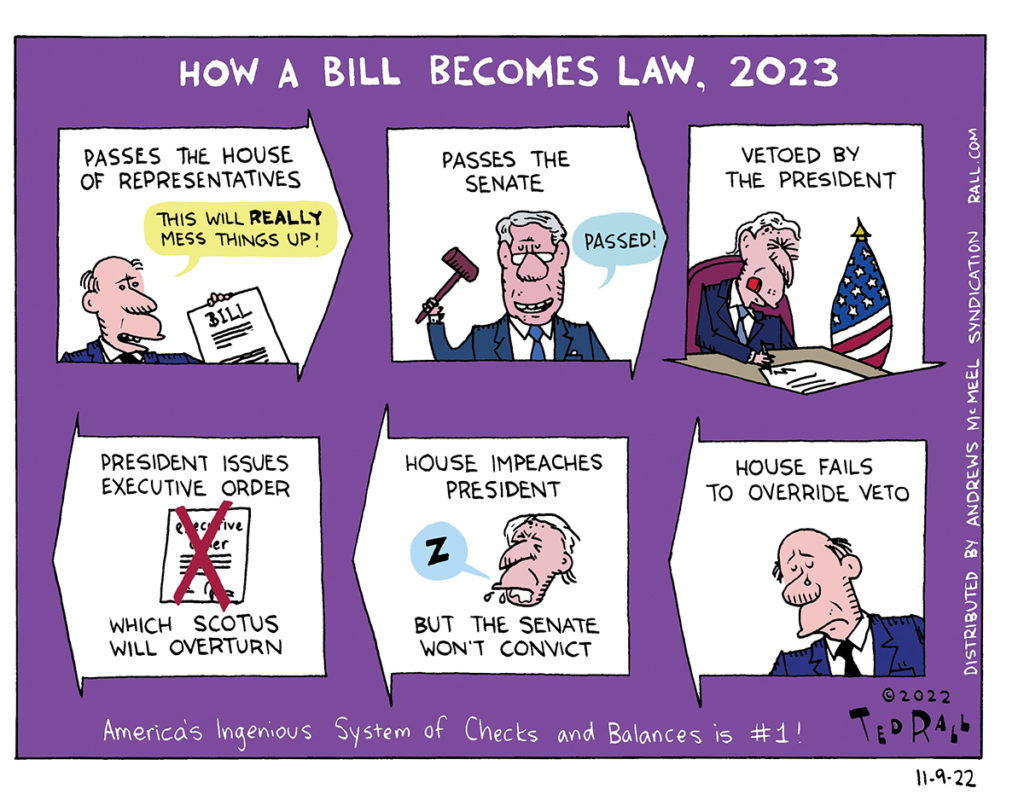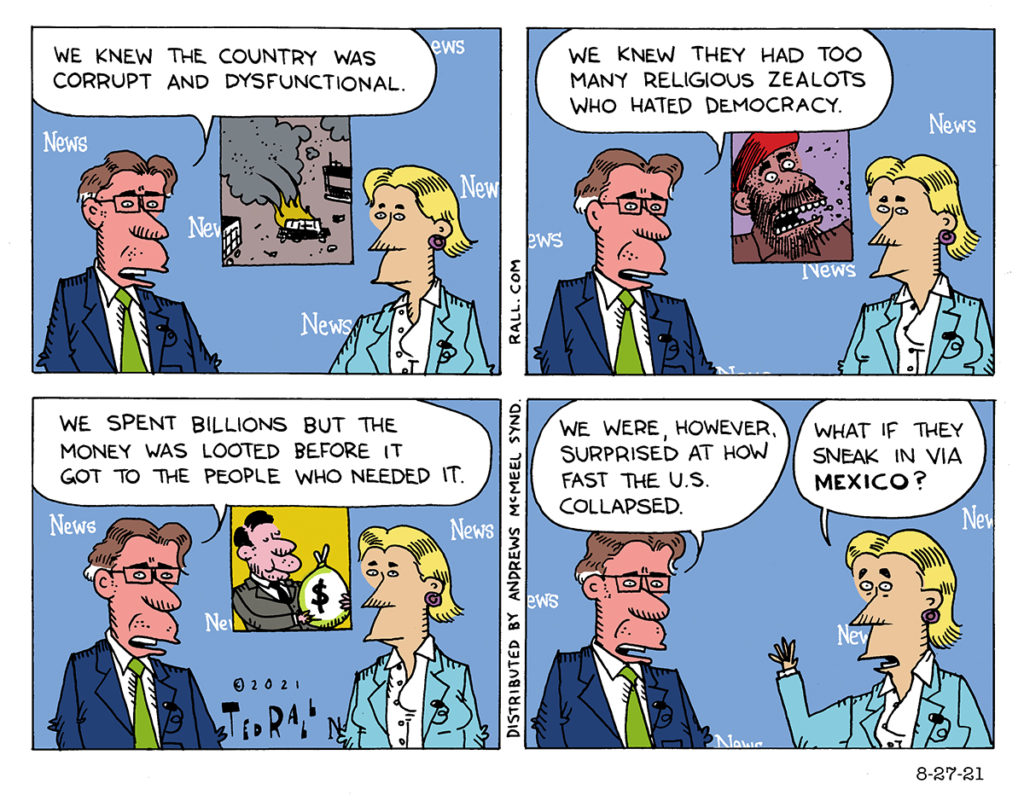The White House advance team, the network of White House and campaign aides tasked with coordinating, designing and staging Biden’s public speeches and events across the country people has become toxic and abusive. The culture within the office has gotten so bad that the White House Counsel’s Office opened an investigation, and a purge of top staff is underway.
The Collapse of the U.S. Government

Taxes are the price we pay for government. But a government that doesn’t provide basic bureaucratic services is no government at all—and it doesn’t deserve our tax dollars.
Afghan translators, and others who worked for the U.S. military and American journalists and NGOs, aren’t Americans and don’t pay taxes. But the U.S. government’s failure to process their applications for Special Immigrant Visas in a timely manner highlights the breathtaking scale of dysfunction, or non-function—to which too many Americans have become accustomed.
When the Biden Administration took over in January, it inherited a backlog of 18,000 SIV applications filed by Afghans who wanted to leave before the scheduled U.S. pullout on September 11. Biden’s folks managed to process 100 a week, before stopping entirely because of a spike in Covid cases in Afghanistan (though no one has explained what the novel coronavirus has to do with immigration given the existence of vaccines and quarantines). Even if they hadn’t quit, at that rate the State Department would only have processed 3,200 applications by 9/11/21, leaving almost 15,000 Afghans out of luck. And that’s not counting the additional 70,000 applications that came in after January.
We discovered water on Mars. We beat Nazi Germany. The IRS processes 240 million returns a year, many of them complicated. If we left the Afghans hanging as the Taliban closed in, it’s because we—well, Biden and his administration—wanted to.
The president’s eviction relief package is another example of bureaucratic no-can-do.
Anyone could see the right way to pay off back rent for Americans who lost their jobs through no fault of their own but rather because they or their employers complied with the government’s orders to stay home and away from work: administer the program federally under HUD, keep paperwork simple, set up a fully-staffed 1-800 number to help distressed tenants, and wire money directly to landlords so the dough doesn’t get diverted to other bills. These days, however, the last thing anyone, including the government, wants to do is to hire full-time employees—an attitude that is, of course, a big part of the joblessness problem. So Congress outsourced Biden’s $46.5 billion federal rental aid program to the states. Because the feds didn’t offer to compensate them for the extra work, many states didn’t bother. As a result, only about 10% of the rental assistance funds have been disbursed. Now the Supreme Court has stopped the CDC’s eviction moratorium—and Americans who should have received help will lose their homes.
Even the IRS, an organization whose mandate is to extract cash from companies and individuals, has collapsed. Millions of people are waiting for refunds because the agency has a backlog of 35 million unprocessed returns, a fourfold increase over a year before.
Government doesn’t work. Contact a Congressman or Senator via their official website and you may not even receive an automated acknowledgment, much less actually hear back about your concern.
Call a government office—local, state, federal—and, if they’re not closed for some obscure holiday, you’ll wind up on permahold. Or they’ll hang up on you after ages on permahold.
Americans are self-reliant. If you want something done, do it yourself. I’m fine with that.
What I’m totally not fine with is paying good money for a service I don’t get. That’s a ripoff. If you advertise that you perform a service and I pay for that service, you had better give me what I paid for. To do otherwise is fraud.
Our government commits fraud every day.
Congressmen promise to serve their constituents. Their websites say they reply to queries. If they don’t, why are we paying their salaries?
I don’t want to hear excuses about being short-staffed. Early American politicians like Thomas Jefferson set aside hours a day to reply to letters from citizens. “From sun-rise to one or two o’clock,” our third president noted, “I am drudging at the writing table.”
You know neither Ted Cruz nor AOC spends 15 minutes a day doing that. It’s a bigger country now, but computers and freelancers easily make up for the higher volume of correspondence.
About Afghanistan again, what’s the value of American citizenship if your passport doesn’t get you out of a war zone? Many Americans were stuck in Kabul, unable to get to the airport due to large unruly crowds and Taliban checkpoints. Yet the military refused to leave the airport to escort them from their places of shelter. Only when news accounts emerged about other countries like France and the United Kingdom, real countries with actual governments that work sometimes, sending their troops into the streets to rescue their nationals, did the U.S. order a few desultory forays into Kabul which, by the way, the Taliban had no objection to.
Oh, and State Department officials: there is no excuse for leaving the U.S. embassy in Kabul, the biggest consular operation in the world, empty. The Taliban didn’t ask us to do so; to the contrary, they’re guarding the compound in the hope that we’ll return. Abandoning that facility is a cowardly abdication of our duty to U.S. nationals and allied Afghans who need diplomatic assistance and representation. It is absurd that, if I return to Afghanistan, there will be no U.S. presence in a country that actually wants it. There’s danger—but many career diplomatic corps types would gladly accept the risk. I’m not a tax resister, but why am I paying taxes?
For Christ’s sake, hire some staff!
Ronald Reagan campaigned on the joke that some of the scariest words in the English language are, “I’m from that government and I’m here to help.” That joke would fall flat now. No one from the government promises anything; assuming they exist in the first place, they don’t even bother to return your phone call.
(Ted Rall (Twitter: @tedrall), the political cartoonist, columnist and graphic novelist, is the author of a new graphic novel about a journalist gone bad, “The Stringer.” Now available to order. You can support Ted’s hard-hitting political cartoons and columns and see his work first by sponsoring his work on Patreon.)
SYNDICATED COLUMN: Smart Young People Who Snub Politics Are Smart

Smart Young People Reject Public Service — Because They’re Smart.
America’s best and brightest don’t go into politics.
(By which we mean mainstream two-party corporate politics. Democrats, Republicans, Washington. Politics as activism, as the ongoing debate over how we should live our lives, remains of great interest to young people.)
Mediocrity among the members of the political class is often cited as a reason for government’s ineptitude, its inability/unwillingness to address the great problems we face today: climate change, soaring income inequality, the Third Worldification of America. If we had smarter, more charismatic politicians, the reasoning goes, we’d get smarter, more effective problem-solving.
Forget it. The word from the trenches of academia is that that’s not going to change. Millennials just aren’t interested.
A national survey of 4200 high school and college students conducted last year found that only 11% might consider running for political office. Most young people say they want nothing to do with a career in government.
We don’t know how that number compares to the past. As Fareed Zakaria points out, “Americans have always been suspicious of government. Talented young people don’t dream of becoming great bureaucrats.”
Still, like other mainstream media types, Zakaria thinks disinterest in public service has increased. “The New Deal and World War II might have changed that for a while, but over the past 30 years, anti-government attitudes have risen substantially,” he says.
Young people think politicians can’t/don’t make much of a positive impact in people’s lives. In a poll of 18- to 29-year-olds, Harvard’s Institute of Politics found a 5% increase, to a third, in the portion of young adults who believe that “political involvement rarely has any tangible results.” When asked about the statement “politics today are no longer able to meet the challenges our country is facing,” 47% agree and 16% disagree.
I was thinking about this a few weeks ago while researching a column about the possible presidential candidacy of Hillary Rodham Clinton in 2016. First lady, senator, secretary of state — Clinton is one of the most successful political figures of our time. Yet what has she actually accomplished? How has she changed the life of the average American? Where is the big feather in her foreign policy cap? She’s been busy, but she hasn’t done anything historical — and the same could be said of almost all her peers.
Future coulda-been bests and brightests are paying attention to Washingtonian disfunction. “How deep is the disengagement?” Ron Fournier asked in The Atlantic. “I spent two days at Harvard, and couldn’t find a single student whose career goal is Washington or elective office. One wouldn’t expect to hear this at the Kennedy School of Government.“
Which prompts two questions:
Why are the young eschewing politics?
Can we do anything to make a career in politics/government more appealing?
Zakaria offers a “why”: “The ever-increasing obstacles — disclosure forms, conflict-of-interest concerns, political vetting — dissuade and knock out good candidates.”
I disagree. Getting exposed for financial or other improprieties is a concern for some political prospects in their 50s or 60s. But the most that your average 21-year-old college senior has to worry about getting outted over is drug use, and if current trends continue, no one is going to care about that in a few years. After all, George W. Bush and President Obama both used cocaine.
Not long ago I was approached by an Important Democratic Party Official about running for Congress. After he saw a talk I gave to a group of high school students, he pronounced himself so impressed that wouldn’t stop calling me. The party needs you, he said. So does your country.
Heady words. And I’m at least as egotistical as the next bear. So I looked into it.
I wasn’t concerned about personal disclosures. I’d be running as far to the left as you can in today’s Democratic Party; my district is very liberal on social issues. Whatever came out wasn’t bound to hurt my prospects. Anyway, I have a theory about political strategy: your opponents can’t use your deeds against you. They can exploit your denial of those deeds. Candidates who reveal their own skeletons find the electorate much more forgiving than when they’re uncovered by their opponent’s “opposition research” team.
Money would have been a major issue. You need at least $1 million to fund a Congressional campaign. It’s easiest if you have it yourself, and if you have rich friends willing to bankroll you. I don’t.
This is a grim system we have. “Wealthy candidates who try to buy office with their own money tend to lose, but in order to set up a campaign, you have to know a lot of wealthy people and wealthy special interests — and that’s something that most of us are not privy to,” Craig Holman, government affairs lobbyist for Public Citizen, told CBS News.
I might have been able to sell out to local business interests in exchange for favor chits to be cashed in later. But then, why run in the first place? For me, the point of running for Congress is to have a chance to change things for the better.
Washington has plenty of you-scratch-my-back-I’ll-scratch-yours corruption as it is. (I’m talking to you, Former Treasury Secretary/Warburg Pincus President Timothy Geithner.) They don’t need more from me.
The money thing is pretty much insurmountable.
Even presupposing a dramatic upturn in my finances (Powerball win? Selling a kidney to a desperate Internet billionaire? Kickstarter?), there’s the question of what I could accomplish in Congress. This is assuming, of course, that I win. Half of candidates lose, with nothing to show for their million-plus bucks.
Like the kids at Harvard, I can’t think of a single Congressman or, for that matter, Senator, who has managed to achieve much for the working class, or the environment, or anything big, since, well — my entire life. And I’m 50. As a political junkie, I would have heard of something.
Senator Ted Kennedy was one of my political heroes. I worked for two of his presidential campaigns. But let’s be honest. What was his greatest political accomplishment? Probably the State Children’s Health Insurance Program. A nice piece of law to be sure, but a small-bore one — and hardly worth spending decades of your life sitting through endless boring meetings.
And that’s what you do in Congress. You sit on your ass waiting for a chance to talk to people who are waiting for you to shut up so they can talk.
To an empty chamber.
Perhaps I should amend this: politics makes sense for right-wingers.
Republicans have radically transformed American society in recent years: legalized torture, extraordinary rendition, Guantánamo concentration camp, preemptive warfare, the doctrine of the unitary executive, sweeping tax cuts for the ultrarich and yes, even Obamacare — that one was dreamed up by the right-wing Heritage Foundation.
Liberals and progressives, on the other hand…there’s not much for us in the world of mainstream politics.
If we want leftie — most young people are — bright young things to enter public service, public service is going to have to change first. Obviously, that doesn’t seem likely. So if you’re a smart, energetic young person who wants to change the world, there’s still a place to do that.
Not in Congress.
In the streets.
(Ted Rall’s website is rall.com. Go there to join the Ted Rall Subscription Service and receive all of Ted’s cartoons and columns by email.)
COPYRIGHT 2013 TED RALL




